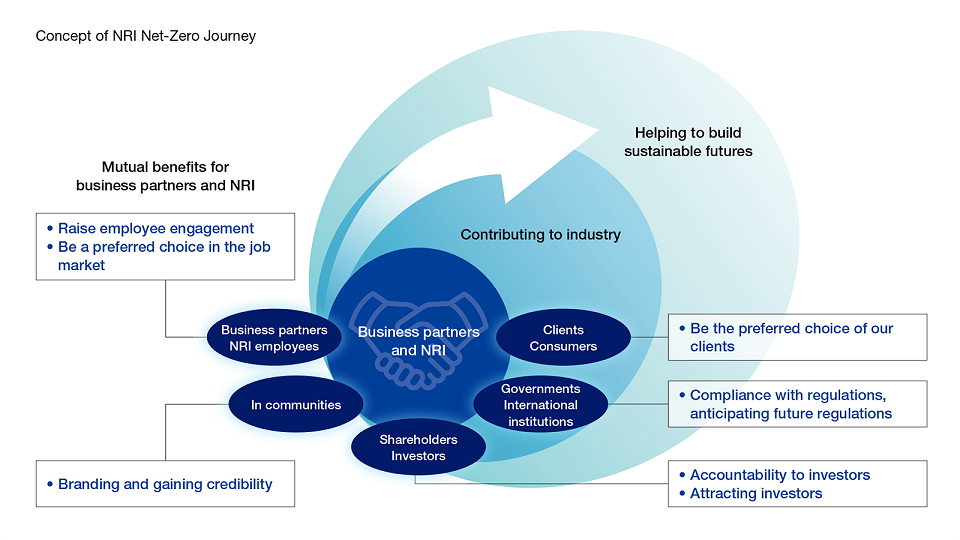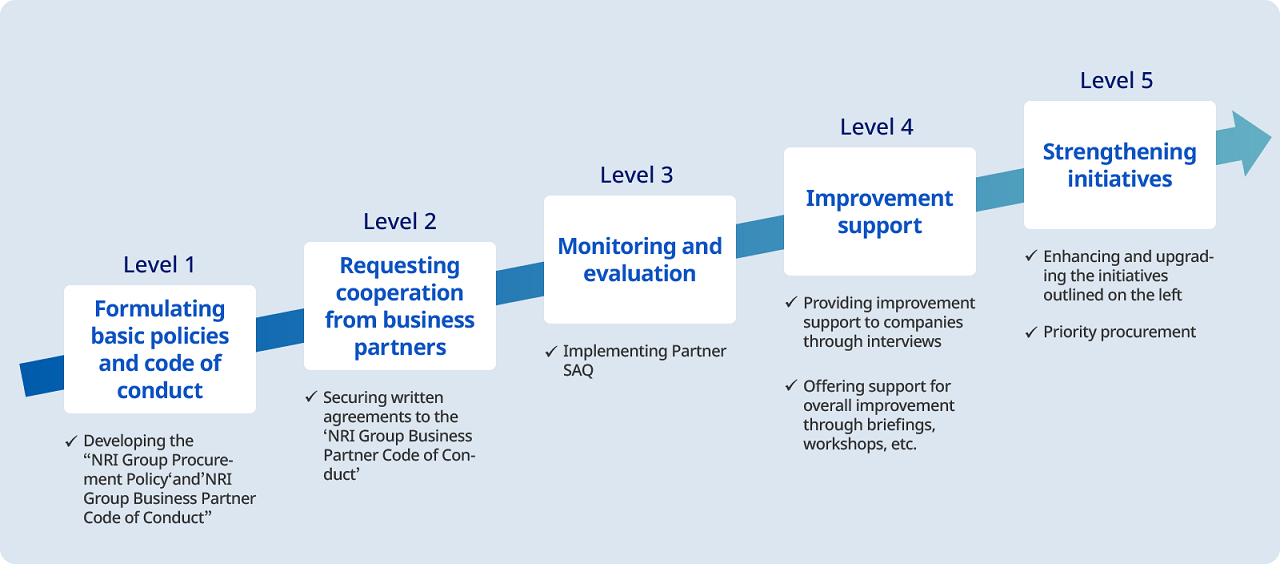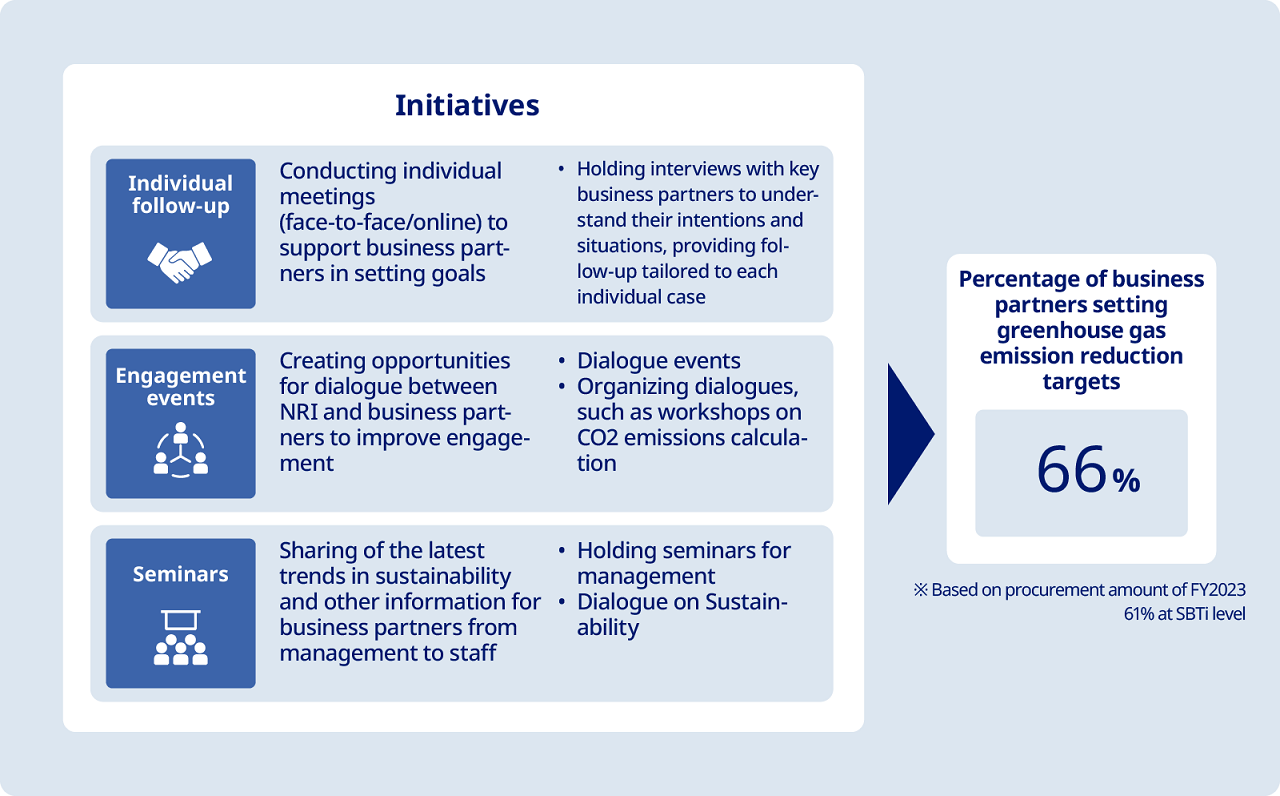NRI Net-Zero Journey
The NRI Group believes that achieving ‘Net-Zero by FY2050’ across its entire value chain requires collaboration with various stakeholders. To support this, the NRI Group is advancing the ‘NRI Net-Zero Journey,’ an initiative to work alongside its business partners toward realizing the net-zero goal.
As illustrated in the image below, the NRI Group is committed to growing alongside its business partners, highlighting the importance of these collaborations in achieving the goal of "contributing to the creation of a sustainable future society."

Visualization of Scope 3
The current calculation method for Scope 3 emissions is based on multiplying activity levels by an emission intensity factor. This approach results in a formula where an increase in activity leads to a proportional increase in greenhouse gas emissions, regardless of any reduction efforts.
The NRI Group believes it is essential to review this calculation method to ensure that reduction efforts
are properly reflected. To this end, we have been participating in the CDP Supply Chain Program* since
FY 2021 and have collected data on the GHG emissions of our clients. We also believe that encouraging
our clients to disclose climate-related data through the CDP Supply Chain Program is a meaningful step
toward achieving net-zero emissions across the entire value chain and society.
Based on the data collected through this program, we are considering changes to our calculation method,
focusing on Scope 3 Category 1 since FY 2022. We have studied this while incorporating input from CDP
experts and have concluded that it is possible to reflect reduction efforts in the figures—even in the
case of an increase in activity volume—by switching from the Ministry of the Environment's conventional
emission intensity factor to each client's own emission intensity factor.
To ensure that reduction efforts across the value chain are appropriately reflected in Scope 3 reductions, we will disclose greenhouse gas emissions after reassessing the calculation method. We also aim to obtain third-party assurance for the results of the post-reassessment Scope 3 emissions calculation.
- * CDP Supply Chain Program: An environmental information disclosure initiative managed by CDP, an international environmental NGO. Through this program, CDP requests suppliers of its member companies to provide environment-related data. CDP then analyzes and returns the collected information to its members.
Engagement with Business Partners
The "NRI Group Procurement Policy" reflects our commitment to building a sustainable society through strong collaboration with our business partners. When selecting suppliers, we consider not only their business performance, product and service quality, delivery times, and pricing but also conduct a thorough evaluation of their environmental, social, and governance (ESG) initiatives. Additionally, our sustainable procurement practices ensure compliance with relevant laws, regulations, and social norms while prioritizing environmental and social impacts.
In FY 2021, we introduced the "NRI Group Business Partner Code of Conduct", which establishes clear guidelines for compliance with laws, environmental considerations, and human rights. This Code was designed to align with the NRI Group’s sustainability objectives and the Responsible Business Alliance (RBA) Code of Conduct. It identifies key areas for collaboration with our business partners to achieve shared sustainability goals.
We have obtained written agreements to this Code, which serves as a company-to-company contract. It stipulates the suspension or termination of business transactions in the event of violations or failure to make necessary improvements after our requests.
Additionally, we require business partners to complete a Self-Assessment Questionnaire (SAQ) and regularly engage with them based on both the Code of Conduct and the SAQ. Based on these results, we assess the situation and support companies in making improvements, including organizing briefings and workshops focused on reducing greenhouse gas emissions. (See next page for details).
In the future, the NRI Group aims to enhance collaboration with business partners by promoting "preferential procurement," prioritizing those who have achieved significant greenhouse gas emissions reductions (e.g., partners who have set targets validated by the Science Based Targets initiative, SBTi).

We are working closely with each of our business partners to reduce greenhouse gas emissions and drive the decarbonization of the entire value chain.
Through ongoing dialogues and the organization of seminars, we actively support our partners’ decarbonization efforts.
